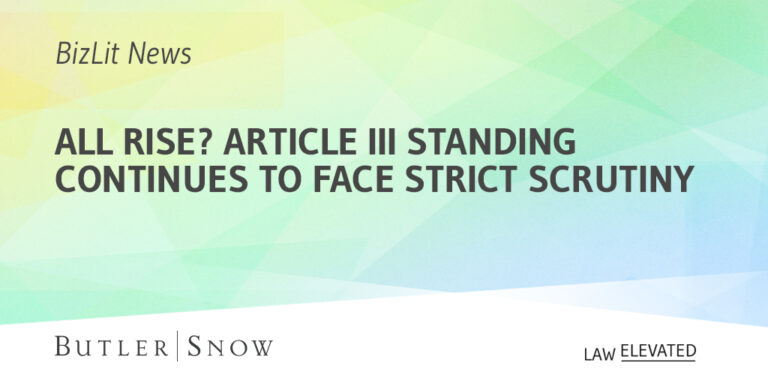In 2016, the United States Supreme Court issued a landmark opinion addressing Article III standing under the U.S. Constitution. See Spokeo v. Robins, ––– U.S. ––––, 136 S. Ct. 1540, 194 L.Ed.2d 635 (2016). The “standing to sue doctrine,” as it is commonly called, is derived from Article III of the Constitution’s limitation of the judicial power of federal courts to “actual cases or controversies.” Id. “The doctrine limits the category of litigants empowered to maintain a lawsuit in federal court to seek redress for a legal wrong.” Id. “[T]he ‘irreducible constitutional minimum’ of standing consists of three elements. The plaintiff must have (1) suffered an injury in fact, (2) that is fairly traceable to the challenged conduct of the defendant, and (3) that is likely to be redressed by a favorable judicial decision.” Id. Ultimately, in Spokeo, the Supreme Court held that “Article III standing requires a concrete injury even in the context of a statutory violation.” Id. at 1549.
Recently, federal courts – including the Supreme Court – have relied on Spokeo as they scrutinize a plaintiff’s standing to sue under Article III. For instance, on March 8, 2019, the United States Court of Appeals for the Third Circuit addressed Article III standing in the context of an alleged violation of the Fair and Accurate Credit Transactions Act (“FACTA”), 15 U.S.C. § 1681c(g). See Kamal v. J. Crew Grp., Inc., 918 F.3d 102 (3d Cir. 2019). In Kamal, the plaintiff filed a class action complaint alleging that the defendant, J. Crew, willfully violated FACTA by including on his receipts the first six digits of his credit card number. The plaintiff sought statutory and punitive damages as well as attorneys’ fees. The plaintiff did not allege that anyone had seen the receipts, that his identity was stolen or that his credit card number was misappropriated. Instead, he alleged that he was improperly subjected to the risk of such future harms.
In the face of a motion to dismiss for lack of Article III standing, the plaintiff alleged two “concrete” harms: (1) that the printing of the information itself constituted a statutory violation resulting in concrete harm and (2) that the statutory violation subjected the plaintiff to an “increased risk of identity theft.” Id. Significantly, the Kamal Court found that the plaintiff “pleaded an injury which no doubt involves a technical violation of FACTA’s ban on printing more than the last five digits of a consumer’s credit card number.” Id. Nonetheless, the Kamal Court – relying on Spokeo – held that the plaintiff had failed to allege that the harm from the technical violation was “sufficiently concrete to create an Article III case in controversy.” Id. Importantly, the Kamal Court noted that an alleged increased risk of identity theft, which is based on a “highly speculative chain of future events,” is insufficient to satisfy the requirements of concreteness. Id. Accordingly, the Kamal Court affirmed the trial court’s dismissal for lack of Article III standing.
On March 20, 2019, the Supreme Court issued a new opinion addressing the holding of Spokeo. See Frank v. Gaos, No. 17-961, 2019 WL 1264582 (U.S. Mar. 20, 2019). In Frank, the plaintiff brought putative class action against Google asserting claims under the Stored Communications Act (“SCA”), 18 U.S.C. § 2701 et seq., and state law alleging that Google violated his privacy by disclosing his internet search terms to owners of third-party websites. Google moved to dismiss for lack of standing. Google’s first motion was granted, but the plaintiff amended the complaint to bolster his standing claim. The second motion was granted in part (dismissing state law claims) and denied in part (allowing plaintiff’s SCA claims to survive). In allowing the SCA claims to proceed, the trial court relied on Ninth Circuit precedent which held that a plaintiff had standing to pursue a statutory violation. Id.
Thereafter, Google negotiated a class-wide settlement. The trial court granted preliminary certification of the class and preliminary approval of the settlement. Subsequently, the Solicitor General filed an amicus curiae brief urging the Supreme Court to vacate and remand the case for the lower courts to address the Article III standing issues. Noting that a federal “court is powerless to approve a proposed class settlement if it lacks jurisdiction over the dispute, the Supreme Court agreed with the Solicitor General and remanded the matter to the lower courts to address the plaintiffs’ standing in light of Spokeo.
Consequently, utilizing Spokeo, federal courts are requiring plaintiffs to show more than a simple statutory violation in order to have standing to pursue a claim. Instead, plaintiffs must allege a concrete and particularized injury arising from the statutory violation. And that’s not always easy to do.
Authored by: Kevin C. Baltz
